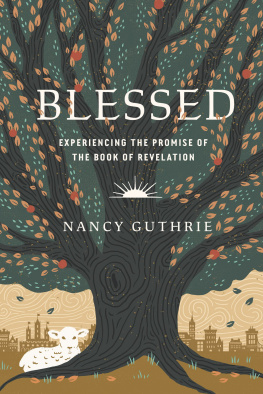Nancy Guthrie - Saints and Scoundrels in the Story of Jesus
Here you can read online Nancy Guthrie - Saints and Scoundrels in the Story of Jesus full text of the book (entire story) in english for free. Download pdf and epub, get meaning, cover and reviews about this ebook. year: 2020, publisher: Crossway, genre: Religion. Description of the work, (preface) as well as reviews are available. Best literature library LitArk.com created for fans of good reading and offers a wide selection of genres:
Romance novel
Science fiction
Adventure
Detective
Science
History
Home and family
Prose
Art
Politics
Computer
Non-fiction
Religion
Business
Children
Humor
Choose a favorite category and find really read worthwhile books. Enjoy immersion in the world of imagination, feel the emotions of the characters or learn something new for yourself, make an fascinating discovery.
- Book:Saints and Scoundrels in the Story of Jesus
- Author:
- Publisher:Crossway
- Genre:
- Year:2020
- Rating:5 / 5
- Favourites:Add to favourites
- Your mark:
- 100
- 1
- 2
- 3
- 4
- 5
Saints and Scoundrels in the Story of Jesus: summary, description and annotation
We offer to read an annotation, description, summary or preface (depends on what the author of the book "Saints and Scoundrels in the Story of Jesus" wrote himself). If you haven't found the necessary information about the book — write in the comments, we will try to find it.
Saints and Scoundrels in the Story of Jesus — read online for free the complete book (whole text) full work
Below is the text of the book, divided by pages. System saving the place of the last page read, allows you to conveniently read the book "Saints and Scoundrels in the Story of Jesus" online for free, without having to search again every time where you left off. Put a bookmark, and you can go to the page where you finished reading at any time.
Font size:
Interval:
Bookmark:
If I asked you to draw a line that captured the past, present, and what you hope will be the future trajectory of your life, what would that look like?
For some of us that line might trace a long season of waiting for marriage or kids or some accomplishment or attainment, and then arc upward with joy or downward in disappointment regarding those things.
For some of us that line might never be straight but demonstrate the turbulence of conflict or constant ups and downs. For others who experience depression, it might be a very flat line.
Maybe in tracing the trajectory of your life there would be a particular eventgood or bad, an act of violence, an accident, some other experiencethat significantly shaped it.
How do you think Joseph, the son of Jacob, would have traced the trajectory of his life? Joseph was his fathers favorite son. After his dad gave him that royal coat of many colors (which indicated he would one day be head of the family), it would make sense that he expected the trajectory of his life to only go upward. Then his brothers threw him in a pit. Down went the line. Then they sold him as a slave. Down. Then he was thrown into prison. Further down. But then, in one day, he was lifted out of prison and set at the right hand of the king of Egyptfrom the pit of prison to the pinnacle of power!
How about Job? What would the trajectory of his life look like? He was a wealthy man with the perfect family, living the good life. Then he lost everything he owned. Down went the line. Then he lost nearly everyone he loved. Down. Then he lost his health. Down. And in the process, he lost his reputation. Down. We find him sitting on a trash heap scraping his sores, wishing he could just get it all over with and die. But then God showed up and revealed himself. Job was radically restored but more than just restored. He was given double of everything he lost. Surely as Job traced the trajectory of his life, it would look like a death and then a resurrection.
How about Jesus ? I think we know exactly how Jesus would trace the trajectory of his life from a couple of passages. Look at Pauls little hymn about Jesus in Philippians 2:
Have this mind among yourselves, which is yours in Christ Jesus , who, though he was in the form of God, did not count equality with God a thing to be grasped, but emptied himself, by taking the form of a servant, being born in the likeness of men. And being found in human form, he humbled himself by becoming obedient to the point of death, even death on a cross. Therefore God has highly exalted him and bestowed on him the name that is above every name, so that at the name of Jesus every knee should bow, in heaven and on earth and under the earth, and every tongue confess that Jesus Christ is Lord, to the glory of God the Father. (Phil. 2:511 )
Down , down , down and then up , up , up .
On the road to Emmaus, after his resurrection, Jesus explained to two of his followers, Cleopas and his companion, that if they had really understood the Old Testament scriptures, they would have expected that when the Christ came, his life would take exactly this trajectorythe trajectory of suffering before glory. He said to them, O foolish ones, and slow of heart to believe all that the prophets have spoken! Was it not necessary that the Christ should suffer these things and enter into his glory? And beginning with Moses and all the Prophets, he interpreted to them in all the Scriptures the things concerning himself (Luke 24:2527 ).
Evidently, while it may not have been explicit, it was clear enough in the writings of the Old Testament that those who read them should have known that the Christ would accomplish his saving work through suffering before entering his glory. Surely Jesus , in interpreting all the Scriptures concerning himself, began at the very beginning in Genesis. What was indicated about the trajectory of the life of the Messiah in Genesis 3:15? I will put enmity between you and the woman, and between your offspring and her offspring; he shall bruise your head, and you shall bruise his heel. Suffering in having his heel bruised. Glory in dealing a deathblow to Satan.
Perhaps Jesus focused in on the lives of Joseph and Job as he talked with his two followers and pointed out the ways in which they provided living previews of his own life. Perhaps he spoke of the suffering servant of Isaiah 52 and 53 who, after being smitten, afflicted, pierced, and crushed, would be high and lifted up and exalted (Isa. 52:13; 53:45). From these passages and so many more, Cleopas and his companions should have been able to put together the suffering with the glory. But they didnt.
It is clear from the disappointment that followers of Jesus felt during his ministry when he withdrew instead of allowing the crowds to take him by force to make him king, and by their response to his deaththe most ignominious death of a common criminalthat a suffering Messiah was not what the Jews had expected.
The Account of Luke
Luke, the Gospel writer, wrote a two-part version of the story of Jesus . We can think of the Gospel of Luke and the book of Acts as a two-part testimony to Jesus . Luke is an account of Jesus s ministry on earth, and Acts is an account of Jesus s ministry in heaven. It is early in Lukes Gospel that we get a hint of the suffering that will be a reality for Jesus . When Simeon took Jesus into his arms at the temple, he said that his eyes had now seen the salvation that was for glory to your people Israel (Luke 2:32). Glory, however, was not all Simeon saw. He saw future opposition that would cause a sword to pierce through Marys soul as she would witness the suffering of her son (Luke 2:35). Luke records Jesus later saying, A disciple is not above his teacher, but everyone when he is fully trained will be like his teacher (Luke 6:40). Jesus got uncomfortably specific about what it was going to look like to be like him, their teacher.
And he strictly charged and commanded them to tell this to no one, saying, The Son of Man must suffer many things and be rejected by the elders and chief priests and scribes, and be killed, and on the third day be raised.
And he said to all, If anyone would come after me, let him deny himself and take up his cross daily and follow me. For whoever would save his life will lose it, but whoever loses his life for my sake will save it. For what does it profit a man if he gains the whole world and loses or forfeits himself? For whoever is ashamed of me and of my words, of him will the Son of Man be ashamed when he comes in his glory and the glory of the Father and of the holy angels. (Luke 9:2126 )
Jesus was going to suffer before being glorified. And he was straightforward with those who were following him that they could expect the same treatment, the same suffering,
A modern-day advertising executive might say that if Jesus was going to be successful selling this discipleship thing, he clearly needed some help. Certainly no one could ever accuse Jesus of pulling a bait-and-switch or of false advertising. His advertisement for followers basically read something like Wanted: Disciples who are willing to leave everything familiar to follow Jesus. Carrying a cross is required. Following may result in death.
Jesus, was straightforward about what being his disciple would entail: self-denial and persecution. Somehow, I think this gets left out of many of our easy-believism invitations to faith today. What gets presented is often an invitation into a life that is going to provide an answer to all your problems; a life that will go more smoothly, not one that may become more difficult. Jesus , however, was clear about what it would cost to be his disciple. He was also clear about where being his disciple would lead. Suffering, for the disciple, would ultimately lead to glory, a glory that would outweigh the suffering.
Font size:
Interval:
Bookmark:
Similar books «Saints and Scoundrels in the Story of Jesus»
Look at similar books to Saints and Scoundrels in the Story of Jesus. We have selected literature similar in name and meaning in the hope of providing readers with more options to find new, interesting, not yet read works.
Discussion, reviews of the book Saints and Scoundrels in the Story of Jesus and just readers' own opinions. Leave your comments, write what you think about the work, its meaning or the main characters. Specify what exactly you liked and what you didn't like, and why you think so.








